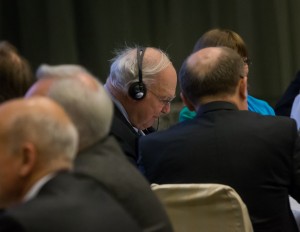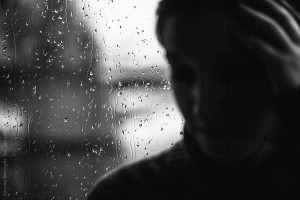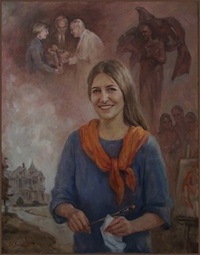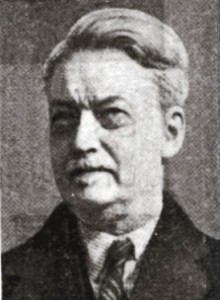First a short introduction to this new blog:
Much of life consists in coming down to earth. Since college days, I have always preferred Aristotle over Plato, because Plato steadily points upwards (too idealistic), and Aristotle’s hand is palm-down, accepting the imperfections of earth. “All knowledge begins through the senses,” he writes. From the first, I loved the coming down to earth of Raphael’s masterpiece, “The School of Athens.”
Moreover, Aristotle’s preference for coming down to earth, I found, fits better with God’s sending His only Son to earth, in mercy. A bit shocking, that the Messiah should come as a poor and undefended man, of low origins and among a far-off, small, and conquered people. Thus does God bring humans down to earth, sneak up on us from below, teach us to look for our sweetest hopes not toward greatness but to littleness – even brokenness and abandonment. I love the bleakness of Isaiah 53, my favorite text for meditation, which often stuns me through Handel’s Messiah.
Thus, I was delighted to make a recent, much blessed trip to Lithuania. All the little states of Eastern Europe need strengthening now by friends from the United States. They feel lonely and very threatened, watching the bloodshed in Ukraine. I remember Reagan reaching out to Poland during the bad days of 1981. American candles in the window, in solidarity.
But what brought me really down to earth was the humbleness of the 1920s convent in which St. Faustina had her vision of Divine Mercy (1933-1936). I was given a half-hour alone in the humble room of the apparition, and gifted two copies of the Ukrainian painting, loved by her, of what she had seen. (Not the happy painting done elsewhere from her written notes, but the dark one, the strong one, the tough one, in which she guided the painter directly.)
* * *
 So, twenty-five years after the collapse of the Berlin Wall in 1989, and after flying from Miami (85° F), there I was in cold and chilly Vilnius, Lithuania (-28 ° F) last November. Last year, 2014, was special year for remembering the great, almost miraculous things that occurred, quite humbly, in the tearing down of the Wall. (This past October, I was also called to Krakow and to Prague for sobering celebrations – and present worries. In Prague, the banner for the conference read: “Democracy, it hurts to think how much we loved you in 1989.” Practicing self-government is a wearying task.)
So, twenty-five years after the collapse of the Berlin Wall in 1989, and after flying from Miami (85° F), there I was in cold and chilly Vilnius, Lithuania (-28 ° F) last November. Last year, 2014, was special year for remembering the great, almost miraculous things that occurred, quite humbly, in the tearing down of the Wall. (This past October, I was also called to Krakow and to Prague for sobering celebrations – and present worries. In Prague, the banner for the conference read: “Democracy, it hurts to think how much we loved you in 1989.” Practicing self-government is a wearying task.)
In Vilnius, I did not hear public worries about another Russian threat. But in private, a young reporter admitted how friends of hers were thinking they should delay marrying, maybe think of emigrating. Russian propaganda is insistent in sowing such fears by publicly accusing Lithuanians of “not behaving well.” Barely disguised threats suffice to sow uneasiness.
The recently begun rotation of 350 American troops into and out of Lithuania, I am happy to report, helps to quiet nerves. A good decision, of which more are needed. The American ambassador there had me over for an hour, and I came away reassured that someone is watching.
In Reagan’s time, during threatening Soviet maneuvers on the Polish border and the imprisonment of hundreds of Solidarnosc activists, there were lights of solidarity lit in millions of American homes, and day after day Lady Thatcher and Reagan made small military and financial moves to rebuke Soviet leadership. Two years before, Pope John Paul II had visited Poland for “nine days that changed the world.” And the Soviets lost their nerve.
Tiny little Lithuania, about 3 million persons, together with its neighbors Estonia and Latvia, feel far weaker than the Russian Bear, and look longingly for stronger responses from the United States and NATO.
It was sad to see how the brilliant hopes of just twenty-five years ago seem so threatened now by erasure, and how asleep leadership in the West is – either asleep, or weak. Burying their heads in the already falling snow.
And yet the lights shine bright in the modern streets of newly built-up Vilnius with its shiny glass buildings. The great Christmas tree just went up in the Old Square around the Cathedral in Old Town. Heroic efforts of restoration during the recent twenty-five years have brought most of the desecration of Old Town by Stalin and Hitler up to freshly painted and refurbished, inside and out.
If tradition is the democracy of the dead, then the generations of the last 500 years of Vilnius’ Old Town are still alive today in the dialogue in Lithuania’s soul. The last of European countries to be Christianized only 600 years ago, courageous and tough Lithuania may still be today (with Ukraine) the closest of all the formally annexed Soviet lands to being a “land of the free, and home of the brave.”
I told audiences that delicious joke about the “Baker-Schevardnadze Pact” of the first Bush administration: a straight-up trade: We get Lithuania, the USSR gets Massachusetts. (The two tallest Lithuanian basketball players on the Soviet team would then bring the U.S. the basketball gold in the next Olympics). The Lithuanians liked being thought of as a land of the free, home of the brave… And when I said “Massachusetts” many in the audience turned to each another chanting “Taxachusetts!”
Among the oldest heroes of Vilnius are three Russian Orthodox monks who threw their bodies against pagan marauders when the latter tried to sack the Church of the Holy Spirit. Today their three mummified remains, in Franciscan-like habits, lie just inside the front portals of that church, as if ready to rise up and to repel again all invaders from abroad.
Since the 1920s, Lithuania suffered the horrors of Stalinist church destroyers, then the Nazi slaughterers of some 70,000 Jews in Vilnius alone, and then again Soviet emptiers and sackers of churches, and burners of homes. Assassinations, barbaric tortures, banishments to the prison-camp Archipelago – what furies were unleashed for more than thirty years.
And yet this is the very city wherein Our Lady of Mercy, swathed in gold, brilliantly reflects the sunset above the Dawn Gate in the ancient walls. And where Poland’s saintly missionary of Divine Mercy, St. Faustina, first saw her visions in the 1930s, in an old and relatively uncelebrated convent (beside an orphanage). This is the city where martyrdom brought out the height and depth of God’s mercy. Down to earth, indeed!
The name mercy goes straight to the heart of God, St. Thomas wrote. Misericordia is God’s heart pouring out to les misérables. God goes to the lowly. Down to earth.
The Archbishop of Vilnius, Gintaras Grušas, a Lithuanian American from California, takes it as a duty to build a fitting shrine to Divine Mercy, and to make the poor convent of Vilnius a pilgrimage center. I hope it will attract many pilgrims who attend the World Youth Day in Krakow in 2016. It is not a long trip from one to the other. Since St. John Paul II deeply cherished the message of St. Faustina, I heartily, heartily recommend it.
Image from my private files.











